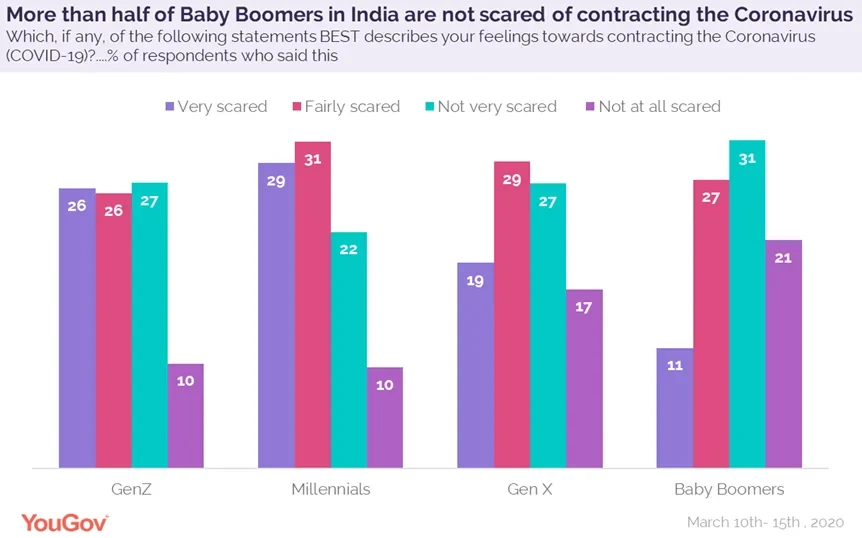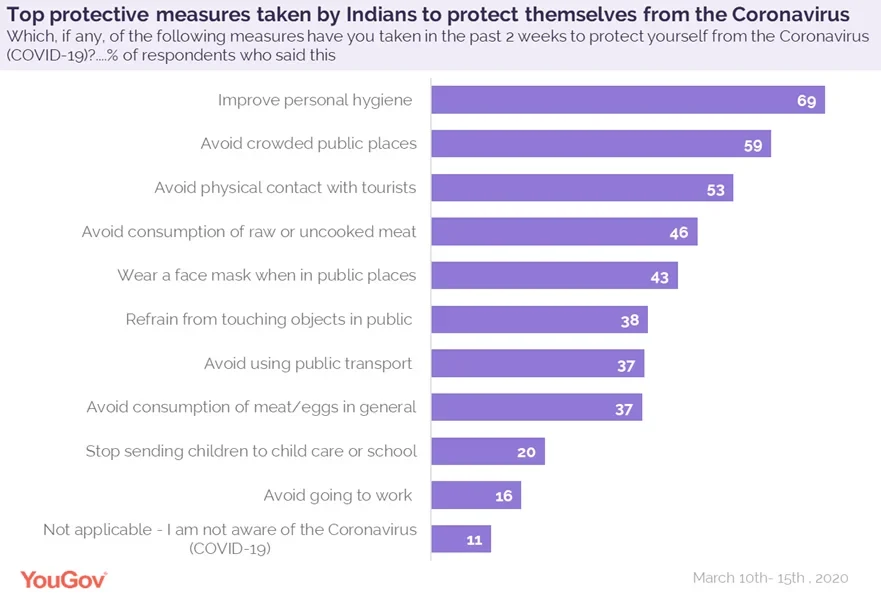
Older adults in India are least fearful of contracting the Coronavirus
Despite being most likely to be at the receiving end of the pandemic, more than half of the Baby Boomers are confident they won’t acquire the virus
YouGov’s latest survey reveals that the older generations of urban Indians seem to be least fearful of contracting the Coronavirus as compared to the other generations.
According to YouGov’s ongoing Coronavirus tracker which captures public sentiment and behaviour around COVID-19, 44% GenX respondents who were surveyed between 10th- 15th March, said they are not at all or not very scared about contracting the Coronavirus.
Fear is notably lower among Baby Boomers, with more than half (52%) saying they aren’t fearful about getting infected. These number are considerably higher than the number of GenZ and millennials saying this - at 37% and 32%, respectively.

On the contrary, there seems to be more fright among the younger adults. More than half of GenZ and millennials respondents said they are ‘very scared’ or ‘fairly scared’ about contracting the Coronavirus - at 52% and 60%, respectively, which is notably higher than the numbers for GenX and Baby Boomers saying this – at 48% and 38%, respectively.
In general, more than half (53%) of urban Indians are scared about contracting the Coronavirus while 38% are not worried. Among the genders, fear levels are considerably higher for women as compared to men (59% vs 47%).
Amongst the different regions in India, North India seems to be the most panic-stricken, with three in five residents saying (61%) they are very scared or fairly scared about contracting the virus. On the other hand, West India seems to be the least scared with less than half (46%) claiming they are either not very scared or not at all scared about contracting it. Until last two weeks, new cases were emerging from the North and South of India and fewer from the western parts of the country. However, starting this week Maharashtra has reported the highest number of cases. This could be the reason for the low level of fears in the western region, which may change in the coming weeks.
The widespread level of fear explains the vast majority of people taking some kind of safety precautions to protect themselves. The most common precaution has been to improve personal hygiene, such as washing hands more frequently or using sanitiser, which seven in ten (69%) are doing.
Three in five (59%) avoid crowded places, and slightly lesser (53%) are avoiding physical contact with tourists. 37% are avoiding public transport altogether. Many (46%) are avoiding consumption of raw or uncooked meat while 37% have given up eating meat or eggs in general.
One in five (20%) have stopped sending children to school or child care and one in six (16%) have stopped going to work themselves.
Given the vast media coverage on the issue, it is not surprising to see that nine in ten (89%) Indians are aware of the Coronavirus outbreak and have heard of either ‘Coronavirus’, ‘Wuhan virus’ or ‘COVID-19’. 11% however, are still unaware of it.

Most (72%) feel well-informed about what to do if they suspect they have coronavirus. But one in five are not sure, with young Indians being especially likely to feel this way (27% of GenZ respondents).
In the weeks to come, YouGov will continue to track public’s attitudes and opinions on Coronavirus across the globe.
Data collected online by YouGov Omnibus among around 1054 respondents in India between March 10th -15th, 2020 using YouGov’s panel of over 8 million people worldwide. Data is representative of the adult online population in the country